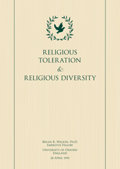If toleration of different religions has grown, one factor which has perhaps incidentally made tolerance of others difficult to withhold has been the growing disparity between the beliefs of theologians and those of some of the more committed laity of the nominally same religious persuasion. A section of the laity continue to affirm the literal inspiration of the scriptures, whilst others, less sure of verbal inspiration, none the less believe in the authenticity of what they understand the scriptures to convey. Clergy, too, though often less remote from ordinary lay believers than are the academic and professional theologians, today often reject central tenets of the faith. Over the past few decades there have been Anglican [i.e. Episcopalian] bishops who have openly dissented from such basic items of Christian faith as the virgin birth, the resurrection of Jesus, and the second coming. Some lay people, within the same denomination, have been deeply upset and scandalized. Theologians have gone further, some of them disputing the existence of a supreme being of the kind traditionally acclaimed by the Christian Church. This current of opinion has been canvassed by some of the most celebrated and distinguished of modern theologians, in particular, it is to be found in the writings of Dietrich Bonhoeffer and Paul Tillich, but may be most readily represented in its most popular and influential expression by J. A. T. Robinson, Bishop of Woolwich. In 1963, the Bishop summarized this trend in Christian thinking in his best-selling book, Honest to God. He set out the arguments for the abandonment of the idea of God as a personal being who existed “out there” and he challenged the whole idea of “Christian theism.” He cited Bonhoeffer:
“Man has learned to cope with all questions of importance without recourse to God as a working hypothesis. In questions concerning science, art, and even ethics, this has become an understood thing which one scarcely dares to tilt at any more. But for the last hundred years or so it has been increasingly true of religious questions also: it is becoming evident that everything gets along without ‘God’ just as before.” [p. 36]
From Tillich, the Bishop cited the following:
“The name of this infinite and inexhaustible depth and ground of all being is God. That depth is what the word God means. If that word has not much meaning for you, translate it, and speak of the depths of your life, of the source of your being, of your ultimate concern, of what you take seriously without reservation … He who knows about depth knows about God.” [p. 22]
For himself, the Bishop says:
“…as he [Tillich] says, theism as ordinarily understood ‘has made God a heavenly, completely perfect person who presides over the world and mankind’ ” [p. 39] “…I am convinced that Tillich is right in saying that the protest of atheism against such a highest person is correct.” [p. 41]
“We shall eventually be no more able to convince men of the existence of a God ‘out there’ whom they must call in to order their lives than persuade them to take seriously the gods of Olympus.” [p. 43]; “to say that ‘God is personal’ is to say that personality is of ultimate significance in the constitution of the universe, that in personal relationships we touch the final meaning of existence as nowhere else.” [pp. 48–9]
Distinguishing, as theologians do, between reality and existence, the Bishop was asserting that God was ultimately real, but that he did not exist, since to exist would have implied being finite in time and space, and thus being part of the universe.
If the idea of a supreme being was challenged so too was the traditional understanding of Jesus. A reinterpretation of the New Testament and of the person of Jesus had also been in progress in the thinking in advanced twentieth-century theological circles. In 1906, Albert Schweitzer had published a work under the translated English title of The Quest of the Historical Jesus, in which he depicted Jesus as a Jewish prophet with somewhat misguided ideas and very much a creature of his time. A more radical and critical “de-mythologizing” was undertaken by Rudolf Bultmann who, beginning in the 1940s, showed how fully the Gospels were subject to the myths prevailing at the time at which they were written. He sought to demonstrate how few of the concepts employed in the Gospels could be accepted by twentieth-century man. The message for mankind of the New Testament he saw very much in the terms of German existentialist philosophy: Christianity became a guide for the moral life of the individual, but he saw it as no longer credible as a body of teaching about God’s creation and his governance of the world. Bultmann’s work raised new doubts about the traditional claim that Jesus was God in the flesh, and hence cast doubt on the entire Christological teaching of the Church. This historical relativism found further expression in a work entitled The Myth of God Incarnate (edited by John Hick) published in 1977, in which a number of the most distinguished of Anglican theologians disputed the orthodox traditional Christian doctrine, established at the Council of Chalcedon [451 AD] of the relationship of God to the man, Jesus. Modern theologians were finding it difficult to believe that God had become man in the way that the Church had taught for the previous fifteen centuries.
These various currents of theological argument: the considered rejection of the concept of a personal God; the relinquishment of theism; the new emphasis on the relativism of the Bible; and the challenge to accepted concepts of the nature of Christ and his relation to the godhead—all amount to a severe departure from the received understanding of Christianity and to the faith of most lay believers. In this way, opinions issuing even from Christian sources concerning the nature of religion were now bringing into question the implicitly Christian criteria by which religion had previously been defined.





























